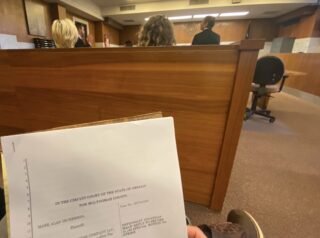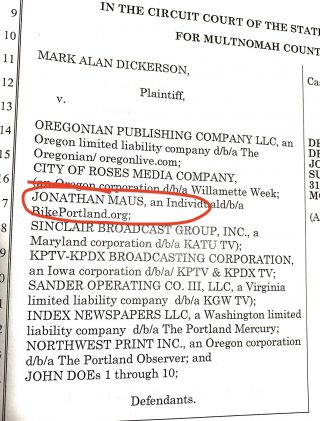
When I first heard I was being sued by the subject of one of my stories, I didn’t think it would amount to much. I certainly didn’t think I’d ever find myself squirming in a courtroom bench as my accuser and a judge read through one of my stories word-for-word.
But that’s exactly where I found myself on Friday afternoon as Multnomah County Judge Melvin Oden-Orr considered the merits of case number 19CV47330. A team of four lawyers representing media companies that own The Oregonian, Willamette Week, KATU and others sat on one side of the room and Mark Dickerson — who chose to represent himself — sat on the other.
It all started December 13th when a man knocked on my door and pushed a stack of papers into my wife’s hands. I had been served papers in a lawsuit brought by Dickerson against myself and seven media companies. Dickerson sought $750,000 against each of us for Defamation and Intentional Infliction of Emotional Distress.
Here’s the backstory:
Dickerson was involved in a traffic incident in October 2018 where he drove his truck through a protest in downtown Portland and was later arrested for coming into contact with a man in the street. In reporting that story, I wrote that Dickerson purposely drove his truck into another person. I also used the story to share personal commentary about how race-fueled vehicular violence was a growing threat to our community. Dickerson claimed he was innocent, that the protestor jumped into his path (a GoFundMe page set up by his wife Janelle Dickerson said the main was “faking getting hit”), that all the news reports were knowingly false, and that he suffered extensive damage to his professional and personal reputation.
Advertisement
At Friday’s hearing the legal team was exercising their right to ask the judge to grant a “special motion to strike” the case before it moved into a full jury trial. As part of Oregon’s anti-SLAPP (strategic lawsuit against public participation) statute that aims to protect free speech of journalists, a defendant is granted this right under ORS 31.150 within 30 days of the case being filed.
In order for the case to move to trial, Dickerson had to first convince the judge he had clear evidence of his claims. “Think of me like the bouncer,” Judge Oden-Orr explained to Dickerson at the outset, “And in order to come through, I need to see your I.D. [evidence]”.
It’s important to note that of the eight defendants, only I was singled out by name. That made me uncomfortable from the start. Why go after me personally, instead of my corporation (Pedaltown Media Inc., the owner of the content)? I wondered. This turned out to be an important fact in the case.
The legal strategy of the other media companies was to focus on what’s known as the retraction statute. ORS 31.210 states that for someone to collect damages in a defamation suit, they must first make a request to the outlet to retract the story. In this case, Dickerson never requested a retraction. He claimed he didn’t have to, and that even if he did, the damage to his reputation would have remained. “You can’t unring a bell,” he pleaded to the judge.
The judge agreed with lawyers for the media companies about the retraction issue and granted their motion to strike. But here’s the thing: Turns out the retraction statute doesn’t apply to BikePortland because the language is outdated. Here’s what the statute says (emphasis mine):
“In an action for damages on account of a defamatory statement published or broadcast in a newspaper, magazine, other printed periodical, or by radio, television or motion pictures, the plaintiff shall not recover general damages unless… A correction or retraction is demanded but not published.”
Advertisement
“Mr. Maus dislikes cars. He hates cars in general. And he’s putting a lot of that on me.”
— Mark Dickerson, plaintiff
Notice how an online-only outlet doesn’t fit that definition? This is a looming problem for Oregon media that needs to be fixed. As an online-only publisher, BikePortland faced added legal risk simply because the statutory language is outdated.
At this point in the hearing, the Judge singled me out (remember, “Jonathan Maus” is the only defendant that’s not a corporation). This is where I started squirming. “Let’s talk about Jonathan Maus,” I recall the judge saying. For the next 20 minutes or so (I don’t recall exactly how long, but it seemed like forever), my lawyer Troy Sexton, the Judge, and Dickerson debated the intent of the words I used in that story.
For Dickerson to make good on his claim of defamation, he had to show that my story had malicious intent.
Sexton defended me by calling on “fair reporting privilege” which is a legal right for reporters to write stories based on official documents (like police statements) and not be held liable for mistakes — or even defamatory statements — in those documents. In the case of my October 2018 story, I relied on the police statement, so I was clear in that regard.
But it was the second part of my story that Dickerson wanted to focus on. Given the context of what Dickerson did, I found it necessary to mix my opinion with the news. “What happened today should not be seen as separate from the growing rhetoric around protestors and their use of the streets,” I wrote. “In today’s emotional political climate where protests are common, older white men feel victimized by a rapidly changing society, and hate toward others feels like it’s at an all-time high, we can’t allow our streets to become even more dangerous because people think it’s justifiable to mow protestors down with their cars.”
Advertisement
Dickerson singled out that section as proof of malice. He read the “older white men” part and told the judge, “He’s talking specifically about me.”
Sexton disagreed, saying, “Maus doesn’t say, ‘Mr Dickerson’ in the general narrative… It’s a commentary on the use of the streets, it’s not about Mr. Dickerson.”
The judge agreed with Sexton, saying my words didn’t rise to the level of malice.
Dickerson continued to make his case. At one point he said, “Mr. Maus dislikes cars. He hates cars in general. And he’s putting a lot of that on me.”
Sexton deftly turned the argument away from the malice question. He instead made the point that listing my personal name as a defendant was incorrect and that mistake itself was grounds for granting the motion to strike. Known as “publication”, a plaintiff must name the publisher of the defamatory content in question. In this case, Pedaltown Media Inc. is the publisher, not Jonathan Maus.
The judge took a short recess and then came back to say he agreed with Sexton on the publication issue and formally granted the motion to dismiss the case.
We won.
I’m still unsure why exactly Dickerson singled me out in the list of defendants (all I can think of is his internal narrative relies on the false idea that I have a personal beef against him and/or his disdain for me won’t allow him to show me the same respect as more mainstream outlets); but in the end it was a costly mistake.
The case was dismissed by the court “without prejudice” however, which means there’s still a chance Dickerson could appeal or re-work his arguments, find new evidence, and file the same case again. I don’t expect that to happen, but you never know.
Thanks for following along. I’m extremely grateful for the help of all BikePortland financial supporters — especially Scott Kocher at Forum Law Group and the legal team at Motschenbacher & Blattner LLP. It has cost about $8,000 so far to fight this lawsuit and there’s no way I could have done it without your help. Thank you!
— Jonathan Maus: (503) 706-8804, @jonathan_maus on Twitter and jonathan@bikeportland.org
— Get our headlines delivered to your inbox.
— Support this independent community media outlet with a one-time contribution or monthly subscription.



